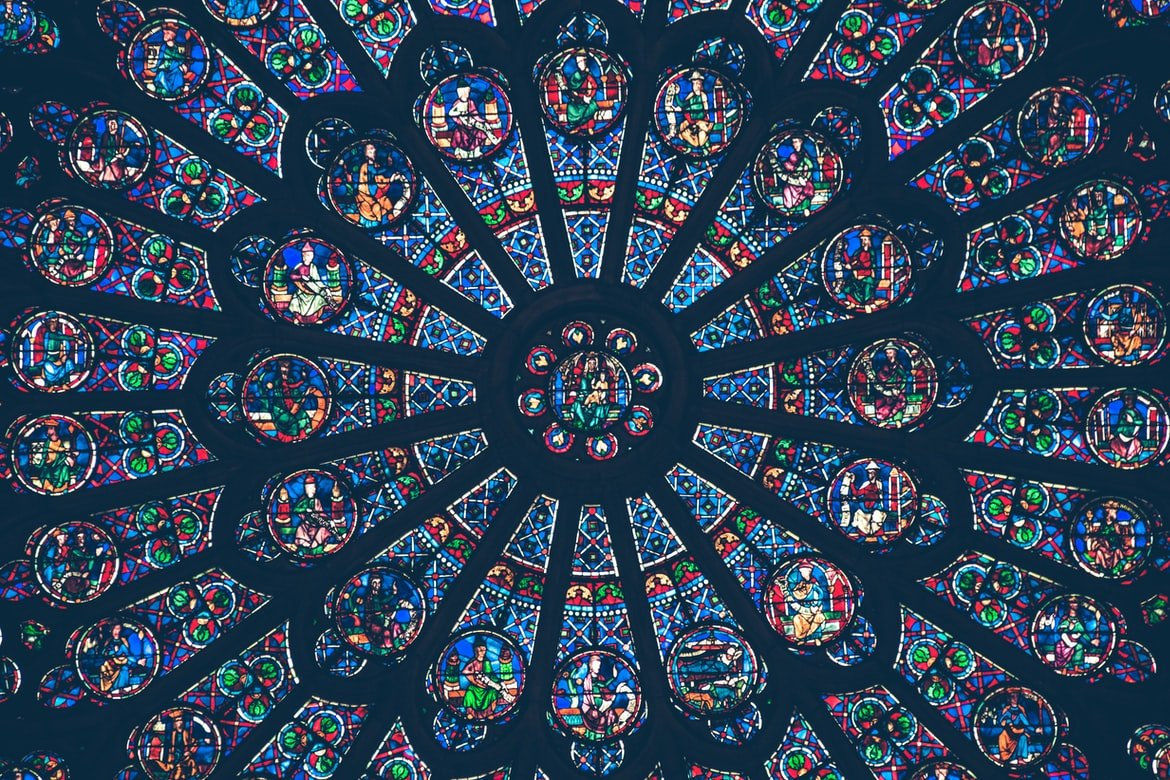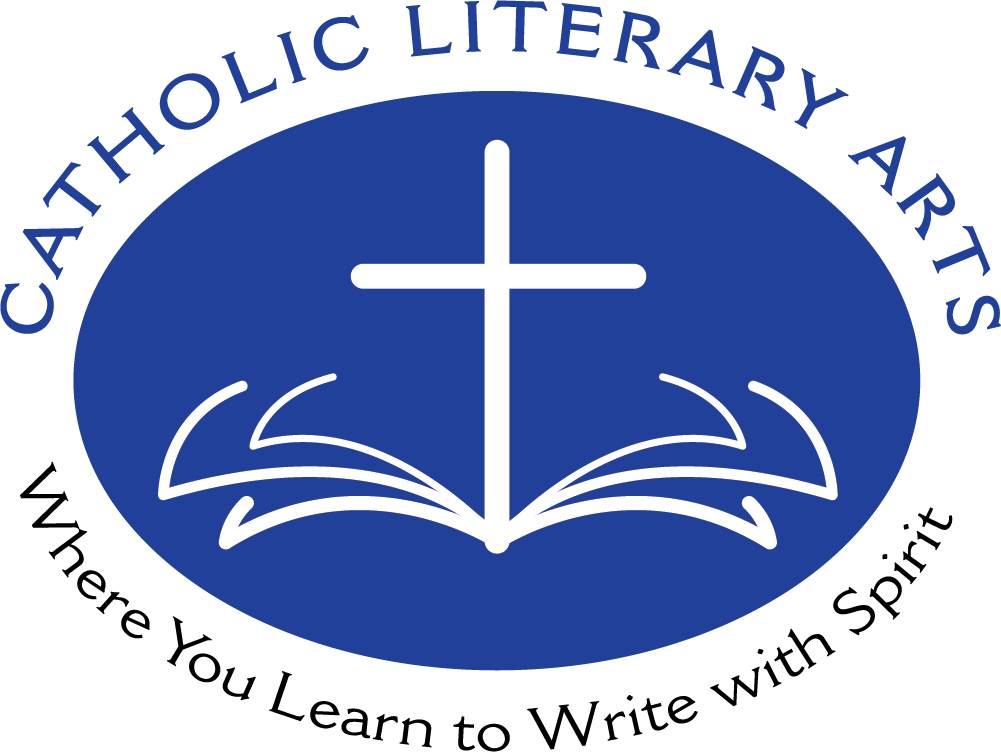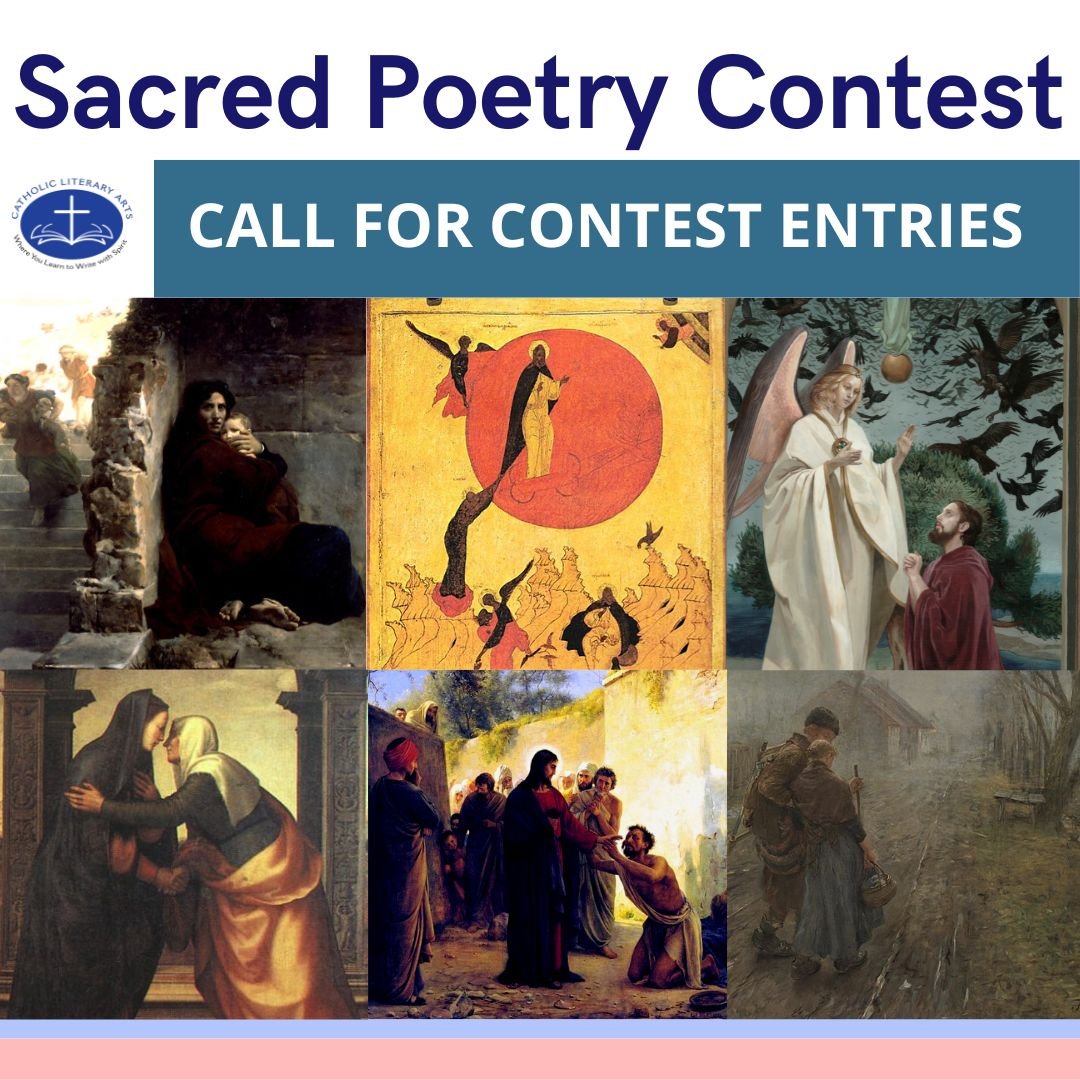
C O N T E S T S
2023 Annual Sacred Poetry Contest
Announcing the Winners of the
2023 CLA Sacred Poetry Contest
Congratulations to the finalists and winners of CLA’s 2023 Sacred Poetry Contest Winners!
This year’s finalists are: Daniel Andrews, Ashley Archuleta, Monika Cooper, Mia Grogan, Heather Kaufmann, J.E. McBride, Tamara Nicholl-Smith, Paul Pastor, V. Paige Parker, Greg Rappleye, Douglas Taylor-Weiss, Gail White and Leslie Williams.
We thank all who entered into the contest and wrote such excellent work to continue the time-honored conversation of Sacred Poetry. Please read the winning entries below!
First Place: Monika Cooper
Second Place: Greg Rappleye
Third Place: Mia Schilling Grogan
Meet Our Judge
We are honored to have Nick Ripatrazone as our judge this year.
Nick Ripatrazone is the culture editor for Image Journal, and the author of The Habit of Poetry: The Literary Lives of Nuns in Mid-century America (Fortress Press, 2023). His previous books include Digital Communion, Wild Belief, and Longing for an Absent God. He has written for Rolling Stone, GQ, The Atlantic, Esquire, The Kenyon Review, America, Commonweal, The Christian Century, and The Sewanee Review. He writes a quarterly column on new poetry for The Millions, and a monthly column about the archives of literary journals for Literary Hub. He has taught literature and creative writing courses at Rutgers University, the College of New Jersey, and in Syracuse University's Project Advance program.
Website: https://nickripatrazone.com/
Third Place
Embrace by Mia Schilling Grogan
Embrace
After “The Visitation” by Marioto Albertinelli
Mary, in the blue of sky intensified --
and so young, your face open,
unwrinkled, you hasten to your cousin
in her need. Two women petrified,
perhaps, framed by a classical arcade
that’s sculpted from serena, the blue stone
pregnant with this meaning: just proportion
begets peace. But Elizabeth, your stride
pushes you past decorum, into Mary’s
space. The joy that erupts in your scarred womb
also leans in to hold this girl, the fears
you share shadowing your face. All worries,
all wonder balance in your embrace, where warm
greens and gold of earth enfold the spheres.
– Mia Schilling Grogan
Comments on Embrace by Judge Nick Ripatrazone
This poem is a gentle and precise ekphrastic encounter with Albertinelli. In his vision, the womens’ convergence is mid-step, their movement juxtaposed with the foundation of the arcade, itself framing a world of blue. “Embrace” is a concise, luminous poem, with deft word choice: the enjambed phrase “just proportion / begets peace” is equal parts melody and wisdom. The poet is aware of the moment’s significance and tension, and takes ample risk with language—“But Elizabeth, your stride / pushes you past decorum”—that ultimately rewards the reader. I can imagine this poem compelling its reader to contemplate the Blessed Mother in adoration, a quite worthy result for a literary work.
Second Place
Notes for a Third Panel of Revelation by Greg Rappleye
Notes for a Third Panel of Revelation
After “John Adores the Angel” (2013) by Bernadette Carstensen-Cody
This is his first try to adore the Angel, who has
called every ravenous bird—the crows, the jackdaws,
the vultures, to feast upon the flesh of kings, the flesh
of captains and lancers, upon the dead and to-be-maimed,
upon the blood of lathered horses and every wild beast.
The Angel speaks of the marriage feast of the Lamb
and John falls to his knees. The Angel, arrayed in white
linen, the pink under-shell of his wings illumined,
his coverts, primaries and secondaries aglow, motions
John to rise and the Angel’s left hand signs to cease
all blasphemy, to worship God alone, as the birds wheel
through the cyclone gray of the painter’s sky.
Note the carrion choughs and ravens, the black interlace
of their wings. Did you see their marvelous kiting?
Did you hear their hunger-calls? Can you find the figs
shaken from trees, as if the stars were swept from the sky?
Rejoice! Now the Woman atop the tarnished-copper moon,
her arms a call for prayer, rises with the wings of an eagle—
or very like a swan’s—and the dreamed-of Child is safe,
busy with the works of heaven.
Can you name each bird called to feast upon the dead?
Do you know the lands from which they flew? Their names
are multitude, the birds are legion and their numbers
are vast. But the holy ones made margin notes,
have disputed through winter nights and made annals
to settle upon their lists. Now the names are written
in the cyclopedias of birds and the great feather atlases
of some past century, so we may know their onomas
and origins. It may be that the squawking, the grinding,
the cries of hawks still to-be-slaked, the slashing of flesh,
can only be heard away from this panel and the tiny house
of its painted frame, its thorny attic, in the blooded valley
below. Do not go there, lest we fall again to worship the Angel,
and be consumed in some fire unwritten,
a greater war yet to come.
– Greg Rappleye
Comments on Notes for a Third Panel of Revelation by Judge Nick Ripatrazone
Through either coincidence or providence, shortly after re-reading this fine poem, I noticed the poet Dana Gioia quoting Charles Baudelaire: “Le beau est toujours bizarre” (“The beautiful is always bizarre.”). Carstensen’s depiction is bizarre, and the poet rightly captures and channels this uniqueness in “Notes for a Third Panel of Revelation.” Lineated poetry has the power to amplify our senses; we often think and speak in prose sentences, but poetry demands new and strange rhythms. The poet demonstrates endurance in this piece; its length is earned. The poet pivots from close and rich description (“lathered horses” hangs in the air when spoken, commanding attention) to second-person questioning: “Do you see their marvelous kiting? / Did you hear their hunger-calls?” It is a work that bears and sustains re-reading, each successive journey offering new skill and sense (“Do not go there,” although absent of the direct “you,” continues this encounter between narrator and reader, as if the poem is a text of midrash). A haunting and notable work.
First Place
Something Higher by Monika Cooper
Something Higher
After the “Elijah on the Fiery Chariot” by Unknown artist
Departures and arrivals. Passengers.
The life of one old man describes an arc:
A sudden collapse from sitting. Messengers,
Come lift my weight, grown lighter than a lark,
The height we rise to not the length I fell
But something higher. Seated in a wheel
That rolls to heaven up the sky from hell,
From smokes of sunrise to noon’s clearest zeal,
With zeal have I been zealous. There’s no need
To say “With me, draw him who shared my yoke.”
I know you’re coming, calling “Father,” Son.
Reach into that which bears me, toward my lead,
And take my cloak, my mockable brown cloak,
Plucking it from the center of the sun.
– Monika Cooper
Comments on Something Higher by Judge Nick Ripatrazone
At their best, ekphrastic poems are in communion with the art that generates them—the process illuminating both. In some ways, the act is akin to translation: when a theme, a feeling, an image, or a character is transferred from one medium to another, the good, hard work has some semblance of divine truth. “Something Higher” is a masterful poem, both in its control of sentence and phrase length among the lines, as well as its embrace of ambiguity. Poetry is an open door, not a shut one, and the best poems compel us to enter and lose ourselves. Through repetition and recursive writing, statements and requests, and a conversational tone that invites the reader into the work, the poet captures a stirring moment: "The height we rise to not the length I fell / But something higher." Among these great works of art, this piece by an unknown artist is perhaps the anomaly—in color and composition, as well as spatially surreal. There were a number of strong poems about this work of art—a testament to the strength of writing submitted to this year’s contest—yet “Something Higher” especially stands apart through its sublime final three lines. What surprise they contain! And what glory.
Contest Information
Contest has closed
Winners posted on CLA website:
June 1, 2023 by 11:59 p.m.
The judge is Nick Ripatrazone.
The judge’s comments will be posted along with the text of the winning poems, visual image, and link to author’s websites, if applicable
All non-winners will be notified June 2, 2023 via Submittable.
Virtual Winners’ Reading:
Winners and finalists will be invited to read their entries at a virtual celebration via Zoom, June 6, 2023. 7:00 pm, CST.
Text and Contest Parameters (Submittable):
One fee of $25. Up to three poems may be submitted. Only one submission per poet. Files may be .doc, .docx.
Instructions for poets:
Please give the title of each poem and the number and title of the sacred image to which it is a response by completing the Submittable form designed for this purpose. Name of poet must not appear in or on poem itself or in the file name when submitted. A list of the images and artists is given for your convenience.
Click on an image for a larger view. Scroll through the larger images using the left and right arrows.
1. León Cogniet – Massacre of the Innocents
2. Matilde Oliviera – Workshop of Joseph
3. Mariotto Albertinelli – The Visitation
4. Bernadette Carstensen – John Adores the Angel
5. Carl Bloch – Healing of the Blind Man by Jesus Christ
6. Dony Mac Manus – St. Joseph and the Child Jesus
7. Unknown artist, 16th Century – Elijah on the Fiery Chariot
8. Fritz Von Uhde – Transition to Bethlehem
For more information about the artists, visit their website:
1. Léon Cogniet – Massacre of the Innocents (Public Domain)
2. Matilde Oliviera – Workshop of Joseph https://matildeolivera.com/en/obras-singulares/
3. Mariotto Albertini – The Visitation (Public Domain)
4. Bernadette Carstensen – John Adores the Angel (Triptych detail) http://www.bernadettecarstensen.com/triptych
5. Carl Bloch – Healing of the Blind Man by Jesus Christ (Public Domain)
6. Dony Mac Manus – St. Joseph and the Child Jesus https://donymacmanus.com/the-art/pentecost
7. Elijah on the Fiery Chariot (Public Domain)
8. Fritz Von Uhde – Transition to Bethlehem (Public Domain)
Guidelines for the Contest:
All poems submitted will be ekphrastic poems. That is, they are literary responses to the art presented in this contest.
Additional Definitions:
Technical proficiency: the poet employs devices of sound and language, form and image, in fresh and powerful ways.
Creativity: the poem reveals a unique, unexpected approach. The poem speaks to the power of the visual image and taps into the eternal perspective of a spiritual journey toward the Trinitarian God.
The search for Truth: the poet grapples with some aspect/s of the human condition within the story of Salvation history.
Prizes:
First place prize: $250
Second place: $200
Third place: $150
The first prize-winning poem will be published in Catholic Arts Today, an international publication of the Benedict XVI Institute, San Francisco.
The three prize-winning poems will be published on the Catholic Literary Arts website. The three winning poets will be awarded a year’s membership to Catholic Literary Arts.
Specifics:
All poems must be original, unpublished in print, on the web, or in limited edition books.
Simultaneous submissions are not allowed.
Submissions will be primarily in the English language.
International submissions are allowed, if Paypal will process the payment.
Line maximum per poem: 48 lines (does not include title or stanza breaks)
Format: all poems must be in 12 pt. font in a typeface of Times New Roman, Arial, or other easy to read typeface. We regret that we're unable to accept handwritten pages.
Form: all forms and free verse are accepted.
Entry Fee: $25 for up to three poems. Poets are limited to a single entry of up to three poems.
Entry is open to poets aged 18 or older on the date of submission.
All submissions are handled through Submittable
Judging:
All judging is blind judging. The name of the poet must not appear on the poem itself or in the file name when submitted. The Submittable system will direct each poet to completion of a form that stores the poet's identifying information and other pertinent information related to the entry.
Deadlines and Dates:
The contest opens 02/01/23 for submissions.
The contest ends 04/30/23 at 11:59 p.m. CST.
Winners will be announced on the Catholic Literary Arts website by June 1, 2023, 11:59 p.m. CST.
Ineligible to Enter:
Catholic Literary Arts board members and charter members of the Catholic Poetry Society are ineligible to enter. Persons under age eighteen on the date of submission are ineligible to enter.
Any winning entries that are found in non-adherence to contest guidelines will be disqualified. Winners will be required to submit IRS Form W-9 for payment of awards.
Communication with Catholic Literary Arts and Submittable:
If you have a question, please email cathla.org@gmail.com and enter 2023 Sacred Poetry Contest in the subject line.
Meet Our Judge
We are honored to have Nick Ripatrazone as our judge this year. Nick Ripatrazone is the culture editor for Image Journal, and the author of The Habit of Poetry: The Literary Lives of Nuns in Mid-century America (Fortress Press, 2023). His previous books include Digital Communion, Wild Belief, and Longing for an Absent God. He has written for Rolling Stone, GQ, The Atlantic, Esquire, The Kenyon Review, America, Commonweal, The Christian Century, and The Sewanee Review. He writes a quarterly column on new poetry for The Millions, and a monthly column about the archives of literary journals for Literary Hub. He has taught literature and creative writing courses at Rutgers University, the College of New Jersey, and in Syracuse University's Project Advance program.
Website: https://nickripatrazone.com/
Celebration of Winners and Finalists
We invite all poets and friends to join Nick Ripatrazone and the winners and finalists in a virtual Celebration of Winners and Finalists, June 6, 2023 at seven p.m. CST. An array of poetry editors from literary publications will join us.











